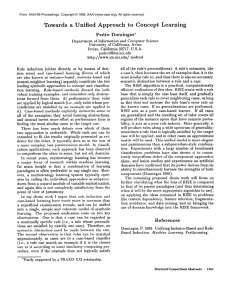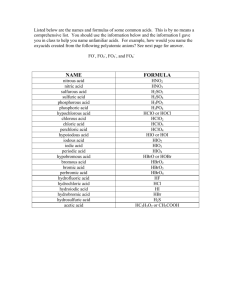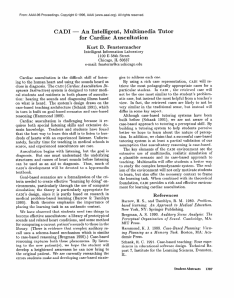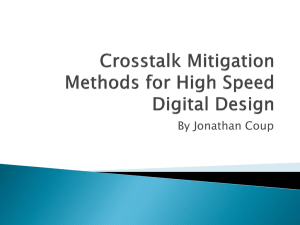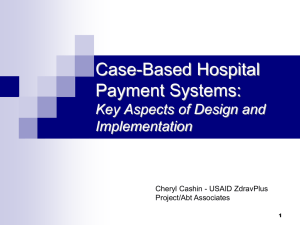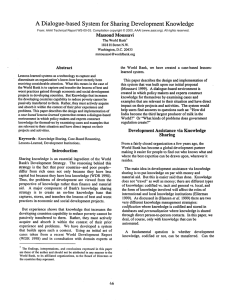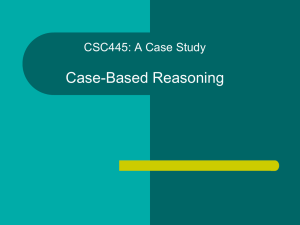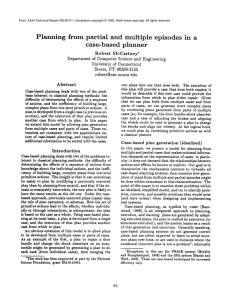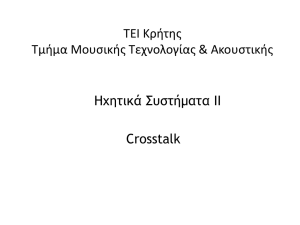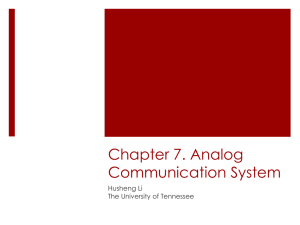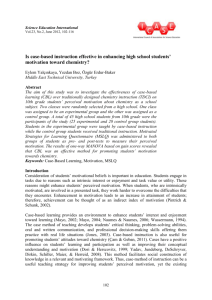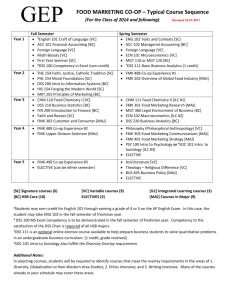Presentation
advertisement
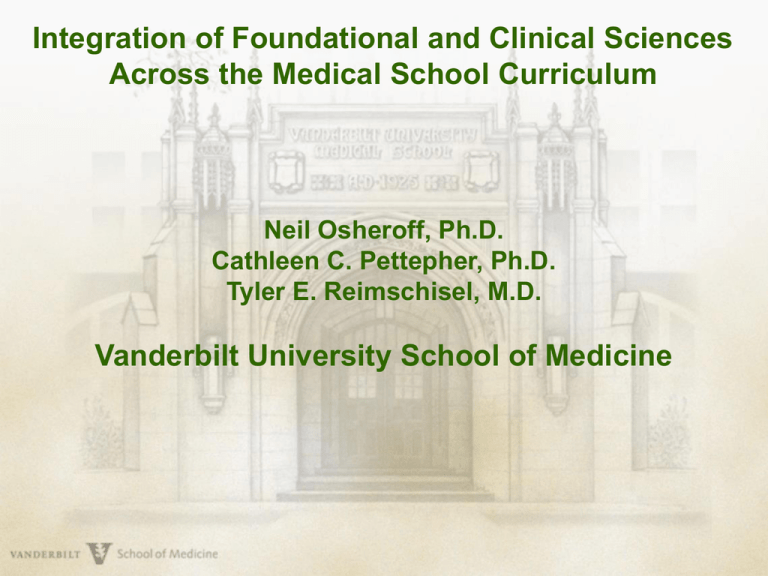
Integration of Foundational and Clinical Sciences Across the Medical School Curriculum Neil Osheroff, Ph.D. Cathleen C. Pettepher, Ph.D. Tyler E. Reimschisel, M.D. Vanderbilt University School of Medicine Curriculum 2.0 To create a responsive, agile system of lifelong learning that: Embraces innovation and improvement Fully integrates learning with patient care Rapidly translates discovery into practice Supports the professional growth of teachers and learners Creates physician leaders Traditional Medical School Curriculum Pre-clerkship Basic Sciences Clinical Years 1-2 Clerkship Clinical Basic Sciences Years 3-4 Vanderbilt Curriculum 2.0 Foundations of Medical Knowledge (FMK) Foundations of Clinical Care (FCC) Immersions Foundations of Healthcare Delivery (FHD) Learning Communities/Colleges Old Curriculum (pre-2007) Current Curriculum (1.0) New Curriculum (2.0) Discipline/department-based courses Interdisciplinary courses Interdisciplinary blocks Individual courses are highly integrated Individual blocks are extensively integrated No crosstalk between courses Some crosstalk between courses Extensive crosstalk between blocks (horizontal & vertical) No crosstalk between years Little crosstalk between years Mostly passive learning Largely passive learning Extensive crosstalk between all phases Basic sciences, social sciences, & clinical separated Basic sciences, social sciences, & clinical separated Little (if any) integration of disciplines Mostly active learning Basic sciences, social sciences, & clinical integrated FMK Phase Professionalism Health Care Health Care Systems Leadership Infection & Antimicrobials Immune Response Inflammation Autoimmune Diseases Rheumatology Proteins, Nucleic Acids Signal Transduction Metabolism, Genetics Cell & Tissue Biology Fundamentals, Introductory Pathology, Anatomy, and Pharmacology Endocrinology GI/Nutrition Reproduction Cardiovascular Pulmonary Renal Hematology All disciplines (including anatomy) are incorporated into every block Neuroscience Brain/Neurology Mind (Psychiatry/ Behavior) Musculoskeletal FMK Phase Weekly Schedule Monday 8:00 AMNoon 1:00 PM 5:00 PM Tuesday Case-Based Learning Groups Wednesday Case-Based Learning Groups Large/Medium Group or Lab Large/Medium Group or Lab Thursday Friday Case-Based Learning Groups Large/Medium Group or Lab Large/Medium Group or Lab Afternoons 1 day per week in Continuity Clinical Experience 1 day per week in small groups for Physical Diagnosis At least 2 days per week protected time for study Learning Community Large/Medium Group or Lab Physical Diagnosis Educational modalities include: Large group sessions, Flipped classroom, Case-based learning, Team-based learning, Patient sessions, Laboratories (CTB, Path, GA) Students are treated as young professionals from the beginning of medical school Human Blueprint and Architecture 2014 - Week 5 Monday 8/25/14 Tuesday 8/26/14 Wednesday 8/27/14 Case-Based Group Session 8A: Danielle Brady,a 4-Month8:00 AM Case-Based Group Session Old Girl w ith Hepatomegaly Tissue Biology Laboratory: 8B: Danielle Brady, a 4and Cardiomegaly Connective and Adipose Month-Old Girl w ith Case-Based Group Session Tissue Lab Hepatomegaly and 9A: Jane McDonald, a 24-YearCardiomegaly 9:00 AM Old Woman with Malai se, Time Thursday 8/28/14 Friday 8/29/14 TBL Session: Ethics of Genetic Testing Case-Based Group Session 9B: Jane McDonald, a 24Year-Old Woman w ith Malaise, Nausea, and Abdominal Pain Nausea, and Abdominal Pain Speci alized AA Prod & Pur/Pyr Complex Molecular Metaboli sm Metabolism: Post-translation 10:00 AM Modification and Learning Communities Clinical Biochemistry: Peroxisomes Ethics: Ethical issues in Hypoglycemia, Acidosis, and Neurogenetics: Genetics and Screening, Testing, and Hepatocellular Dysfunction Biochemistry of Complex Metabolism: Therapy Basic Response I: Cellular 11:00 AM Lysosomes and Lysosomal Developmental Impairment Response to Injury Storage Diseases Cells of Connective Tissue and Adipose Tissue 12:00 Noon 1:00 PM Pharmacological Concepts: Pharmacokinetics 2:00 PM Pharmacological Concepts: Pharmacokinetics Foundations of Healthcare Delivery: Students in Clinic One Afternoon During the Week 3:00 PM Physical Diagnosis: Vital Signs 4:00 PM Large Group Sessions CBL Small Group Sessions TB & Path Lab Sessions TBL Small Group Sessions GA Laboratory Sessions Clinical Sessions Review Sessions Examinations Assessment in FMK Phase Ultimate grading is Pass/Fail Weekly assessments: MCQ quizzes, essay questions (other: TBL, etc) Mid-block formative peer, self, and facilitator assessment of small groups (competency-based milestones) End-of-block summative assessment: 2-3 days (depending on length of block) 1-2 days self-regulated learning before assessment Integrated essay examination (includes all components taught during the block) Practical examination (tissue biology, pathology, and gross anatomy) NBME multiple-choice examination End-of-block formative peer and facilitator assessment of small groups (competency-based milestones) Students must receive a passing grade in knowledge and small group work in order to pass the block Foundational Sciences in the Clinical Phases Foundations of Clinical Care Phase Continuation of Learning Communities Overt Discussion of the Foundational Sciences as Part of the Clerkships (Underlying basis of illness, symptoms, treatment, etc) Diagnosis and Therapy Course Foundational Sciences in the Clinical Phases Immersions Phase Highly individualized phase tailored to the interests and needs of the student Foundational Sciences in the Clinical Phases Immersions Phase Acting Internship (AI): Close approximation to internship Advanced Clinical Electives (ACE) Formal curriculum (objectives, competency-based assessment) Deliverable from student to care team Integrated Science Course (ISC) Multiple disciplines in focused clinical area Cancer, critical care, obesity, global health, congenital malformations, etc Topics Courses (Classroom-based) Focus on knowledge in focused area (statistics, development, policy) Master Adaptive Workplace Learner (MAWL) Students in ACE courses identify a patient-driven problem and in conjunction with a clinical and basic science mentor research the problem and report (written and oral) back to the clinical team Research/Scholarship (3-6 months) Congenital Malformations ISC 4-week course for third and fourth year students Offered once a year Interprofessional care of children with complex congenital malformations Students work in pairs in 1 of 4 areas each week Urology, cardiology, craniofacial, and neurogenetics Sciences: molecular biology, developmental genetics, embryology, histology, anatomy, physiology, pathophysiology, pharmacology Other threads: systems of care, developmental disabilities, communication skills, interprofessional teams Clinical venues: OR, PICU/NICU, wards, clinics, cath lab Other venues: family resource center, community agency visits Congenital Malformations ISC Classroom Learning Flipped classroom for core sessions (2-3 hours/wk) Research presentation (1 hour/wk) Simulation on conducting difficult conversations Team project using challenge cycle “Parent guide to the care of a child with CL/CP” Team presentations at end of course Early morning or early evening group check-ins each week for debriefing, Q&A, and feedback
